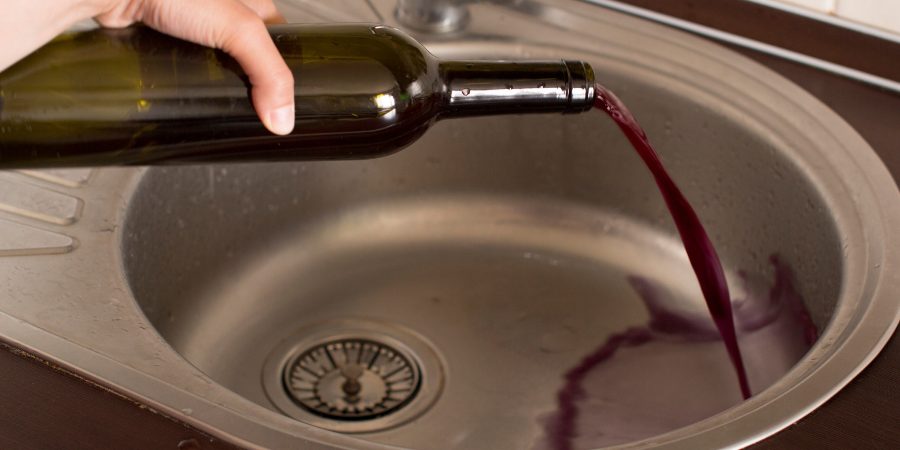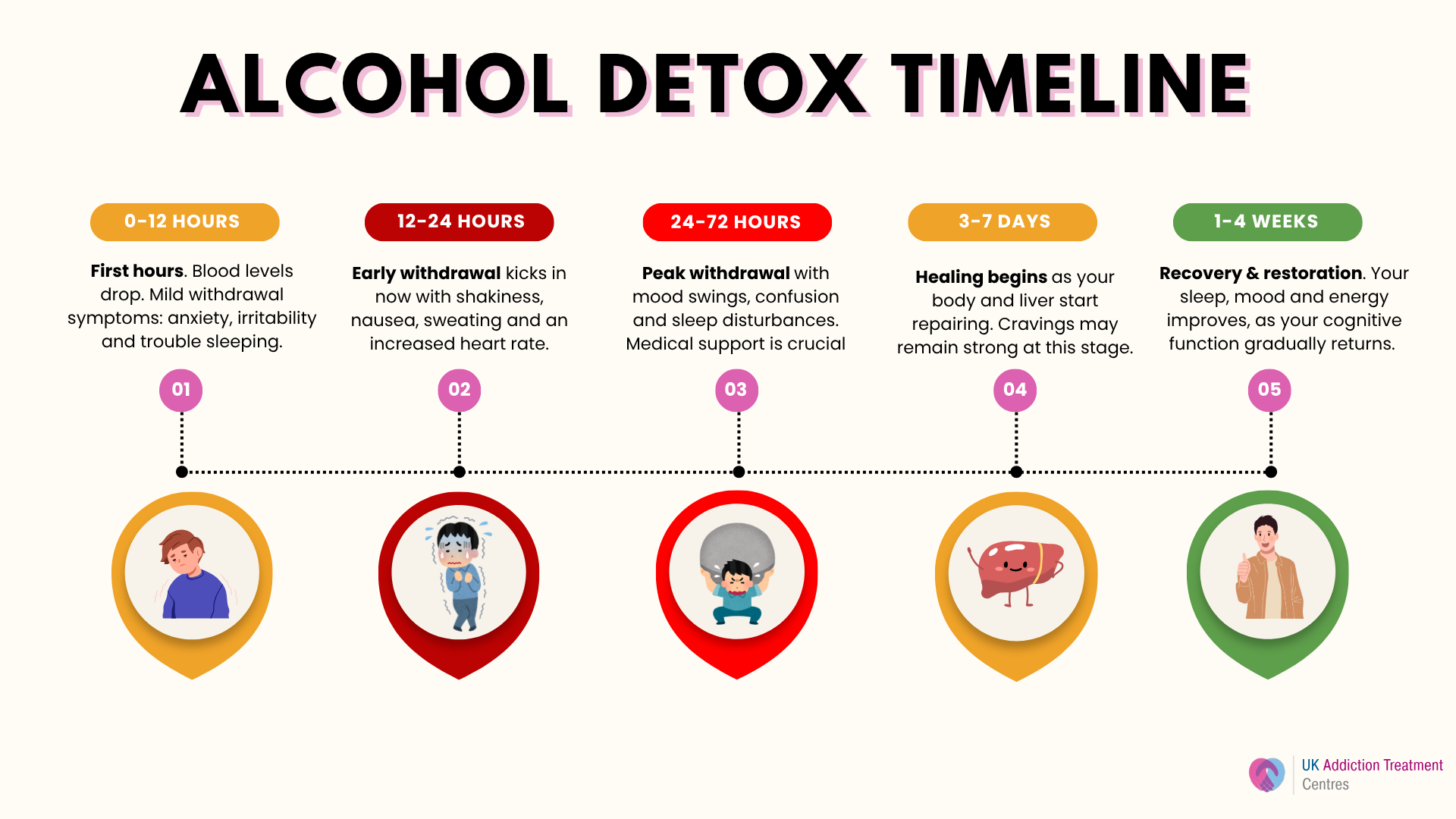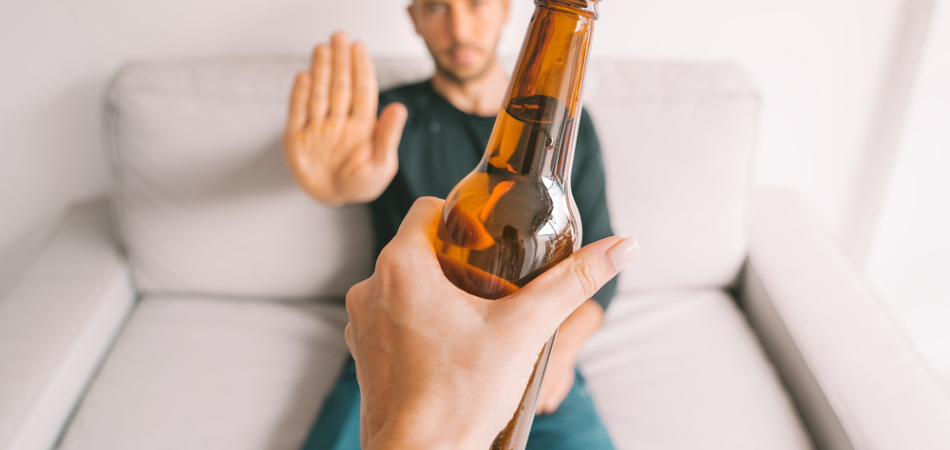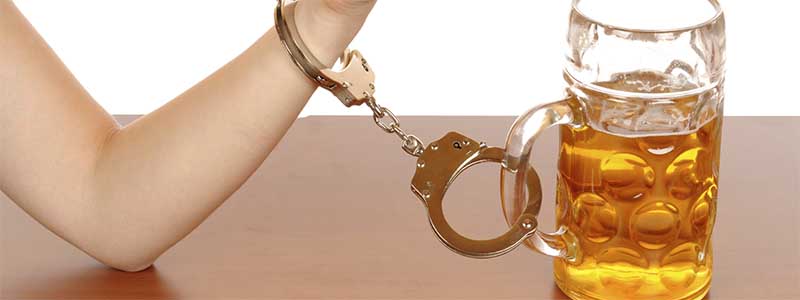
Written by:

Medically Reviewed by:
Last Updated:
November 5th, 2025
Alcohol withdrawal and detox
Alcohol detox clears your system of addictive substances so that you can start treatment with a clear mind. Although it is not an easy process, it is a very important first step on the road to long-term recovery.
Alcohol detox is best done under the guidance of medical professionals because it can be a challenging and sometimes dangerous experience. Medical alcohol detox is available in all of UKAT’s recovery centres, and we have helped thousands of people across the country give up alcohol safely.
Understanding what alcohol detox is, UKAT’s safety-first approach and how it fits within our comprehensive rehab treatment primary care programme can help you get started with confidence.
What is alcohol detox?
Alcohol detox, or alcohol detoxification, is the process of clearing all alcohol and its toxins from your brain and body. It’s the foundation of any treatment plan because it breaks the cycle of physical dependence so real healing can begin.
If you have ever tried to stop drinking before, you will know it’s not as simple as just putting the bottle down or staying out of the pub. When you drink excessively, your brain eventually starts to produce chemicals called neurotransmitters that act as stimulants to balance out alcohol’s depressant effects.
If you suddenly stop drinking, the levels of alcohol in your system begin to fall. Your brain takes a few days to realise that it no longer needs to balance out the alcohol and continues to produce neurotransmitters, resulting in an overload. This overload causes alcohol withdrawal symptoms, which last until your brain has rebalanced.
Alcohol withdrawal symptoms affect people in different ways, and without the right support, they can push you back into drinking or, in some cases, put your health at serious risk. UKAT’s recovery centres provide alcohol detox, which takes the danger out of the process. This means that instead of struggling alone, your detox is planned and overseen by experienced professionals. Our medical alcohol detox programmes include:
- A medical check and personal detox plan when you arrive
- Professional observation and adjustments to your plan if needed
- Support with food, rest and hydration
- Alcohol detox medication (if required)
- A seamless move into alcohol rehab therapy at the same residential centre
UKAT’s centres provide different levels of medical support, so get in touch with us and we can match you with the right centre for your needs.
Who is alcohol detox beneficial for?
Alcohol detox can be very beneficial and even life-saving if you are addicted to alcohol, have already tried to stop on your own and couldn’t, or if you have health problems that make quitting on your own unsafe. Alcohol detox can also have huge benefits for family members who are often the most affected by alcohol addiction.
But detox isn’t just for people with severe addictions. If you drink heavily or regularly, it can still be worthwhile to cut down or stop altogether, and many people take breaks to give their body a reset.
Even if you don’t think of yourself as addicted, it is sensible to check in with your doctor first. Alcohol withdrawal can be unpredictable, and having the right advice or support can make a big difference.
Our bodies have incredible powers of recovery, and after a month, you should see some serious positive changes. The liver is the organ most affected by alcohol, but after only one month, it will have lost around 20% of the fatty deposits caused by drinking. You should also see significant improvements in your energy, skin and cognitive clarity, and you will likely be sleeping a whole lot better.
Our brains also take some serious damage from drinking, and it takes some time before that damage can be repaired. However, after about two weeks of undergoing alcohol detox, your brain will have replaced a large amount of the volume it lost due to alcohol.
While it may seem like an insurmountable task at first, as long as you take it day by day and follow the advice of the medical professionals who are looking after you, it won’t be long before you start to see real progress.
Where is the best place to undergo alcohol detox?
Inpatient detox is the safest and most effective way to stop drinking. This means staying in a residential centre like one of UKAT’s so you can be looked after from the day you arrive until it is time to go home.
Our alcohol detox process begins with an on-arrival medical assessment. This enables staff to plan your detox systematically based on your unique needs. The assessment will look at:
- How long you have been drinking and to what extent
- Whether you have also been using other substances
- Your overall physical health
- Any co-existing mental health and addiction issues, as these can complicate detox
- Whether you tried to quit alcohol before
Your plan is a starting point, but it can change as you go. Our team will keep a close eye on you so we can adapt the support at any time and make sure you stay safe.
At UKAT, we only provide inpatient detox because we know it’s the safest and most effective way. If you can’t come to a centre, we strongly advise speaking to your GP before trying to detox at home. The NHS does offer alcohol detox, but you may need to wait a long time for a bed to become available, which can affect your recovery chances and leave you vulnerable in the meantime.
What alcohol withdrawal symptoms should I expect?
No two people experience alcohol withdrawal in exactly the same way. Your symptoms will depend on how long you have been drinking, how much you usually drink, your general health, and whether you’ve tried to stop before. Some people only feel mildly unwell, while others face much stronger effects.
The most common alcohol withdrawal symptoms include:
- Anxiety and restlessness
- Shaking or trembling hands
- Sweating more than usual
- Nausea and vomiting
- Difficulty sleeping
- Constant irritability
- Headaches
These symptoms are unpleasant but usually manageable with the right care and support. The bigger risk comes with delirium tremens (DTs), a severe form of withdrawal. DTs mainly affect people with long-term, heavy alcohol use, especially if they stop drinking suddenly. DTs can cause:
- Severe confusion
- Vivid hallucinations
- Extreme agitation
- Seizures
- Dangerously high heart rates or blood pressure
- Strokes
- Heart attacks
Without medical treatment, DTs can be fatal, but UKAT’s recovery centres have on-site doctors and some have around-the-clock nurses to monitor you and respond to any emergencies before they happen. This response can include alcohol detox medication, emotional support, and ensuring you stay hydrated and well-rested. DTs are one of the biggest reasons people die attempting alcohol detox at home, so it is never worth the risk.
Medication for alcohol detox
If your UKAT detox team believes you are at risk of severe alcohol withdrawal symptoms, or if your condition begins to worsen after a few days, there are various medications for alcohol detox.
Seizures can be particularly dangerous, and so different benzodiazepines like alprazolam, diazepam and lorazepam are often given to reduce the risk. They work by calming your brain activity, making the process safer and easier to get through.
To calm your central nervous system and soothe your discomfort and agitation, you may also be given certain neuroleptic medications. These can help reduce feelings of restlessness or confusion so you feel more settled during detox.
If you have any mineral or nutrient deficiencies, which many people with alcohol use disorders have, you may also be given nutritional supplements to resolve the imbalances. This helps your body heal faster and gives you more strength for the next stage of recovery.
The alcohol detox symptoms timeline
The reaction to alcohol detox varies from person to person, but you will usually start to experience withdrawal symptoms around six hours after your last drink. These may begin as mild symptoms, and hopefully do not progress into anything more serious.
Symptoms will then tend to worsen during the first couple of days before reaching their peak around the third or fourth day of detox. You may find that you are constantly dehydrated during this time because alcohol acts as a diuretic, which is a chemical that causes frequent urination.
To counter this, make sure you drink plenty of water, as this will help to make the detox process easier. You may also experience the same kind of discomfort that comes with a hangover, like headaches, nausea and restlessness, but staying hydrated will also help with these symptoms.
For most people, the third day of the alcohol detox timeline signals the start of better things to come. At this point, your hydration and blood sugar levels will have returned to normal, and you should start to feel stronger and more like yourself again. Cravings and the hangover-like symptoms should have all abated, and you should find yourself feeling more energised.
As long as you don’t go on to develop any serious complications, these withdrawal symptoms should totally subside around the seven-to-ten-day point. After this, your doctor may decide to prescribe you medication to help you with any ongoing cravings which can arise even after you have fully detoxed.
If you have been a heavy drinker for a long time, you may find that certain symptoms, such as memory issues and problems with attention span and reaction times, still remain, at least in the short term. However, if you stay dedicated to sobriety and receive the right rehab treatment afterwards, you can start to make real progress.
What comes after alcohol detox?
Once detox has cleared alcohol from your body, the next step is the therapy part of rehab treatment. This is where you begin to understand why you drank, how alcohol addiction took hold, and what you can do differently going forward.
At UKAT, our recovery centres offer a wide range of therapies, from one-to-one counselling to group sessions and holistic treatments. Everyone’s needs are different, and different centres provide different therapies, so contact us and we will help you find the programme that’s right for you.
Recovery doesn’t end when you leave rehab, with our aftercare and alumni resources are there to support you long term. This full approach matters because detox tackles the physical side of alcoholism, but therapy and aftercare address the emotional and mental roots that keep addiction going.
Where can I receive inpatient alcohol detox?
Alcohol detox is just the first step on the treatment pathway. If you or someone you know requires alcohol detox, it is important that you seek help as soon as possible. UKAT’s recovery centres provide alcohol detox for all of our clients in safe, comfortable inpatient settings. Our experienced healthcare specialists will be able to assess you to determine your overall health condition, the extent of your alcohol use disorder, and execute a detox plan that will give you the best chance of recovery. Contact us today and take the first step to an alcohol-free future.
Frequently Asked Questions
Mild alcohol withdrawal symptoms include:
- excessive sweating
- tremors
- difficulty sleeping
- nausea
More severe alcohol symptoms may include:
- rapid heart rate
- hallucinations
- seizures






















